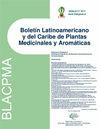西番莲变种 mollissima 提取物对小鼠的神经药理学和抗焦虑作用
IF 0.7
4区 医学
Q4 INTEGRATIVE & COMPLEMENTARY MEDICINE
Boletin Latinoamericano y del Caribe de Plantas Medicinales y Aromaticas
Pub Date : 2024-01-30
DOI:10.37360/blacpma.24.23.1.7
引用次数: 0
摘要
焦虑和抑郁会导致机体生理发生变化。秘鲁和许多国家传统上将几种西番莲叶片的提取物用作抗焦虑药和治疗炎症问题的药物。本研究旨在确定三叶西番莲变种 mollissima (Kunth) Holm-Niels.焦虑通过埋大理石试验进行评估,抑制作用通过欧文试验进行评估(运动活动、支撑基础、步态摇摆、不动、逃跑、易操作、肌肉力量、紧绳、斜面、紧张症、痛觉反射和死亡)。腹腔注射 100 毫克/千克/体重和 200 毫克/千克/体重的剂量可显著降低小鼠的焦虑水平(p<0.05),在 12 项测试中的 11 项测试中抑制作用不明显,地西泮和西番莲提取物的作用方向相似。提取物剂量为 200 毫克/千克/体重时,对小鼠的抗焦虑和抗抑郁作用更强,同时还发现了神经药理学表现,无论使用何种剂量,均未观察到小鼠死亡。本文章由计算机程序翻译,如有差异,请以英文原文为准。
Neuropharmacological and anxiolytic effects of extracts of Passiflora tripartita var. mollissima on mice
Anxiety and depression cause alterations in the physiology of an organism. Extracts from the leaves of several Passiflora species are traditionally used Peru and in many countries as anxiolytic and in treatment for inflammatory problems. This study aimed to determine the neuropharmacological effect of the ethanolic extract of Passiflora tripartita var. mollissima (Kunth) Holm-Niels. & P.Jørg. and its anxiolytic effect on mouse (Mus musculus var. albinus). Anxiety was evaluated with the marble burying test and the depressant effect with the Irwin test (locomotor activity, base of support, wobbly gait, immobility, escape, ease of handling, muscular strength, tight rope, inclined plane, catatonia, nociceptive reflex and death). Doses of 100 mg/Kg/body weight and 200 mg/kg/body weight by intraperitoneal route (i.p.) significantly decreased anxiety levels (p<0.05) in mice, and had a non-significant depressant effect in 11 of the 12 tests, showing a similar direction of correlation between diazepam and Passiflora extract effect. A greater anxiolytic and anti-depressant effects in mice was observed with the extract dose of 200 mg/kg/body weight with neuropharmacological manifestations found where no death was observed at any dose used.
求助全文
通过发布文献求助,成功后即可免费获取论文全文。
去求助
来源期刊

Boletin Latinoamericano y del Caribe de Plantas Medicinales y Aromaticas
PHARMACOLOGY & PHARMACY-
CiteScore
1.30
自引率
14.30%
发文量
49
审稿时长
6-12 weeks
期刊介绍:
The Boletín Latinoamericano y del Caribe de Plantas Medicinales y Aromáticas (BLACPMA), [Latin American and Caribbean Bulletin of Medicinal and Aromatic Plants]; currently edited by the publishing house MS-Editions, is a bi-monthly international publication that publishes original peerreviewed research in the field of medicinal and aromatic plants, with nearly 20 years of experience. BLACPMA is a scientific journal that publishes two types of articles: Reviews (only in English) and Original Articles (Spanish or English), its main lines of action being agronomy, anthropology and ethnobotany, industrial applications, botany, quality and standardization, ecology and biodiversity, pharmacology, phytochemistry, pharmacognosy, regulatory and legislative aspects. While all areas of medicinal plants are welcome and the experimental approaches used can be broad and interdisciplinary; other areas of research that are not mentioned depend on the Editorial Committee for their acceptance.
 求助内容:
求助内容: 应助结果提醒方式:
应助结果提醒方式:


